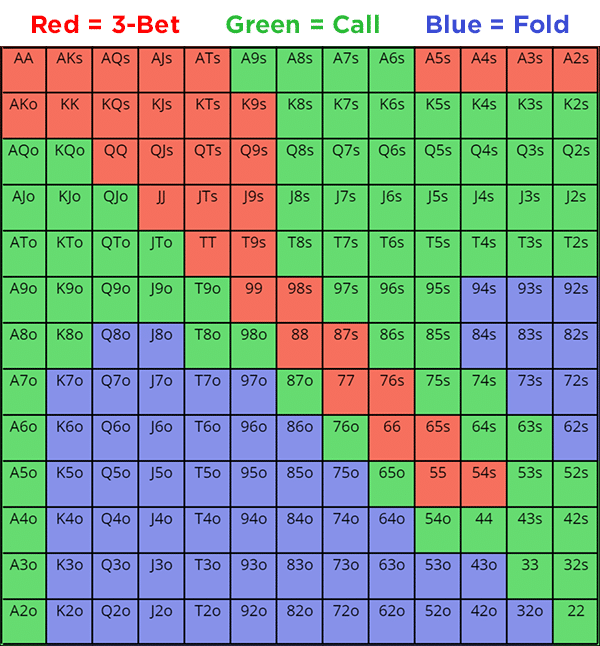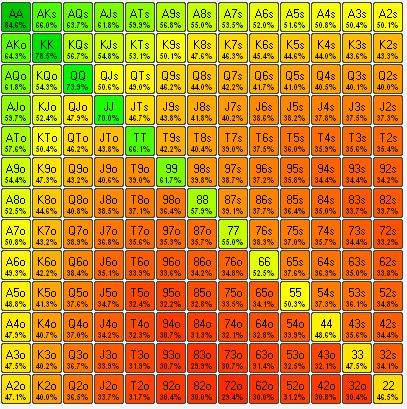Big Blind Defending Range
- The range you've described (adding in broadways/big pairs) means you're only defending 35% of hands. So SB could raise any two cards and print money against you. Plus against SB you have a positional advantage to go with your increased pot odds.
- Defending the Big Blind. Many players make this play by default. When facing a raise from the big blind, they instinctively call because they’ve got it in their head that they need to ‘defend the blind.’. To compensate, we need to play a tighter range. Look for hands like pocket pairs that can flop sets or strong Broadway hands like AK.
- Poker is a game that is constantly evolving, 5-6 years ago, everyone vastly overfolded their big blinds getting too good of a price preflop and giving up too much EV. In the last 2-3 years, players have caught onto this trend and now they probably over defend their big blind with too weak of hands. They have over adjusted in my opinion.
Most Nits and TAGfish (tight regulars) will have a 3Bet of somewhere around 5% at the most. Here is an example of what a 5% 3Bet range might look like: However, many of the TAGs, LAGs and Maniacs (aggressive regs and aggro fish) at these stakes will 3Bet you with a.
In the passive days of early poker, this was much less of an issue. You could call raises pre-flop from just about any position on the table without fear of having to put a ton more money intothe pot thanks to a later position re-raise.
People in those days played straight forward, and if they were re-raising pre-flop, they almost always had the best hand, and you could easily get out of the way or call looking to snap off amonster.
Today’s game is different. Players have learned pre-flop that they can take advantage of weakness and passiveness of other players.
If a loose player opens and you decide to call, a player behind you might elect to 3-bet to put you and the opener in a really tough spot.
The opener will usually have to fold because they have you behind them to worry about and then you are in a tough spot out of position. This becomes even more compounded when we’re in the smallblind.
If the button opens and we just call out of the small blind, the big blind is going to have a lot of incentive to 3-bet a wider range to get rid of the button who is most likely stealing and thenplay a bloated pot in position against you.
You might be saying:
Big Blind Defending Range Hoods

“Well, what if I have a big hand in the small blind? Aren’t they worried about that?”
What would you have done if you had aces in the small blind? You probably would have 3-bet yourself which is what you would have done with every strong hand you have.
This means the big blind KNOWS that you have a marginal hand at best. Yes, as an aside, you can call in the small blind to trap and induce this, but that’s again a discussion for another day.


This is why calling and defending with more marginal hands in the big blind becomes so much more appealing. There is no one to act behind you that can potentially squeeze you out or exploit yourweaker range.
Also, it’s always possible from other positions that a player behind you actually does have a stronger hand that warrants a re-raise.
This can’t happen to you from the big blind because you are closing the action. It might not seem like a big deal if you play in weaker games that are more passive.
Big Blind Defending Range Hoods
Once you step up to playing with higher skilled or more aggressive players, this is going to create issues for you.